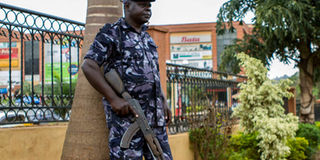Uganda boosts security after US attack warning

A Ugandan police officer stands guard outside a mall in Kampala on March 26, 2015. Uganda said it was boosting security over threats by Somalia's Shebab militants, hours after the US embassy in Kampala warned its citizens of a possible imminent terror attack
Uganda said Thursday it was boosting security over threats by Somalia's Shebab militants, after the US embassy in Kampala warned its citizens of a possible imminent terror attack.
In an emergency warning, the US mission in Kampala said it had "received information of possible terrorist threats to locations where Westerners, including US citizens, congregate in Kampala, and that an attack may take place soon".
"Out of an abundance of caution, the US mission has cancelled some non-essential events scheduled at local hotels in the coming days," the embassy warning said, telling US citizens they "should expect increased security sweeps and delays when entering or exiting hotel areas".
Ugandan defence spokesman Paddy Ankunda said the warning was "absolutely" linked to the Al-Qaeda-linked Islamists, who carried out twin bombings in Kampala in 2010, killing 76 people, but who have been thwarted in their attempts to carry out subsequent attacks in Uganda.
Uganda's police chief Kale Kayihura said the militants were planning strikes against "vulnerable places" in Kampala including hotels, shopping malls, markets and parks.
"I have no doubt that with the vigilance of the public and the time-tested effectiveness of our security forces we shall once again defeat even this latest, desperate attempt by evil forces," he said in a statement.
Ankunda also said the militants have "have identified vulnerable points" as possible targets and that security had been stepped up in response to the threat.
Uganda is a key contributor to the African Union's AMISOM force battling the Shebab inside Somalia, and a key east African ally of the United States.
Shebab determined to hit out
A Western diplomatic source also described the threat as "serious" and "based on concrete information".
The US embassy in Kampala last issued an emergency warning in September 2014. Ugandan and Western security sources later revealed they had intercepted a transfer of explosive suicide vests by suspected Shebab members.
US officials said at the time that the militants -- who have also been losing ground inside Somalia in the face of an AMISOM offensive -- were determined to avenge the killing of their leader Ahmed Abdi Godane in a US air strike earlier that month.
In 2010, the Shebab carried out twin bombings in Kampala targeting a restaurant and a club where football fans were watching the World Cup final between the Netherlands and Spain, killing 76 in the region's worst attacks in more than a decade.
The Islamists were also behind the September 2013 attack on the Westgate shopping mall in neighbouring Kenya's capital Nairobi which left at least 67 people dead, and recently issued a call for fresh attacks against such locations.
Intelligence officials say the Shebab are divided over whether to shift their allegiance from Al Qaeda to the Islamic State, a move reportedly seen by some in the group as a way of revitalising their jihadist credentials, recruitment and sources of funding.
The United States has continued to strike the militants from the air, and last week announced it had killed another senior Shebab figure, Adan Garar, who was linked to the planning of the Westgate attack as well as attempts to attack Kampala.




